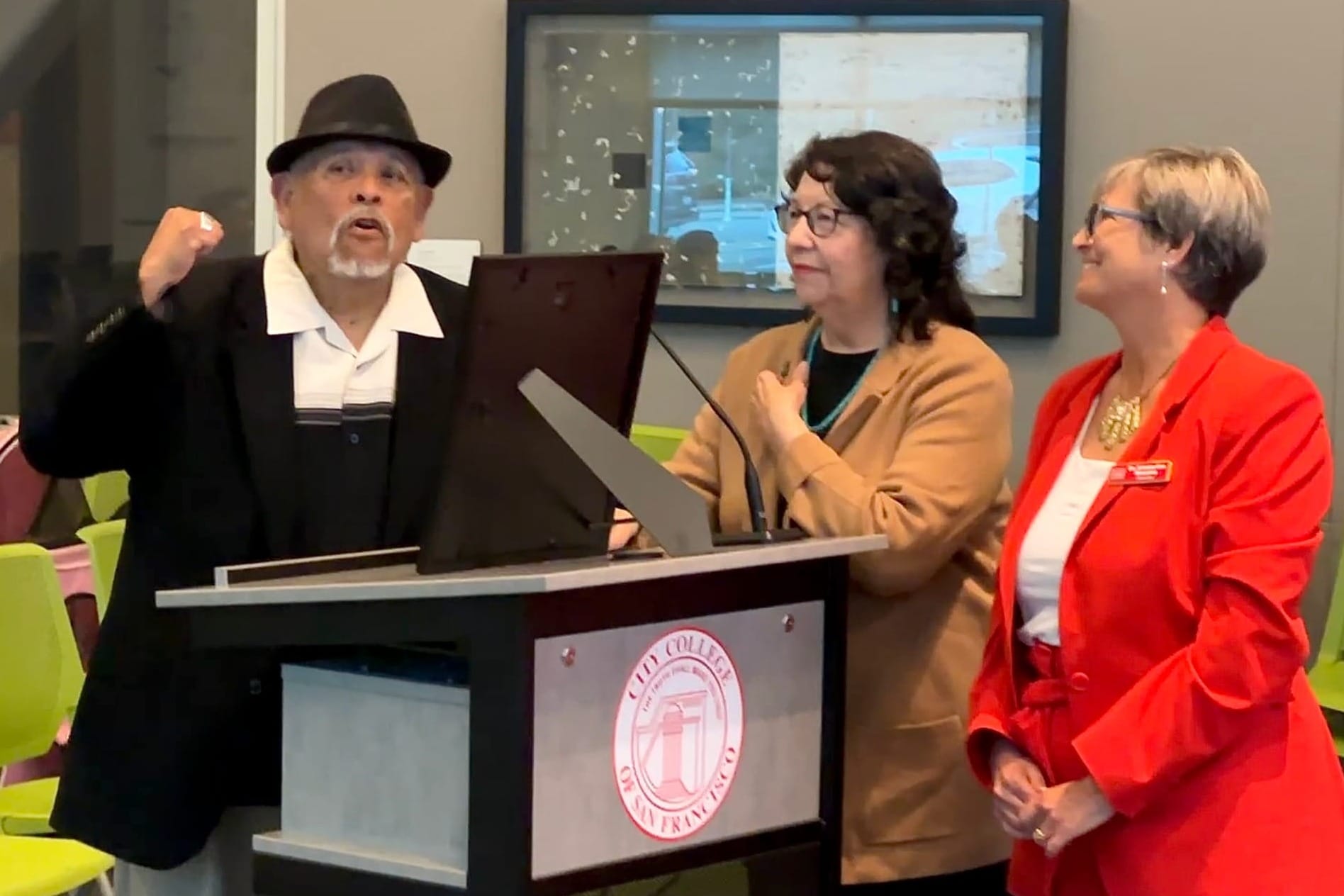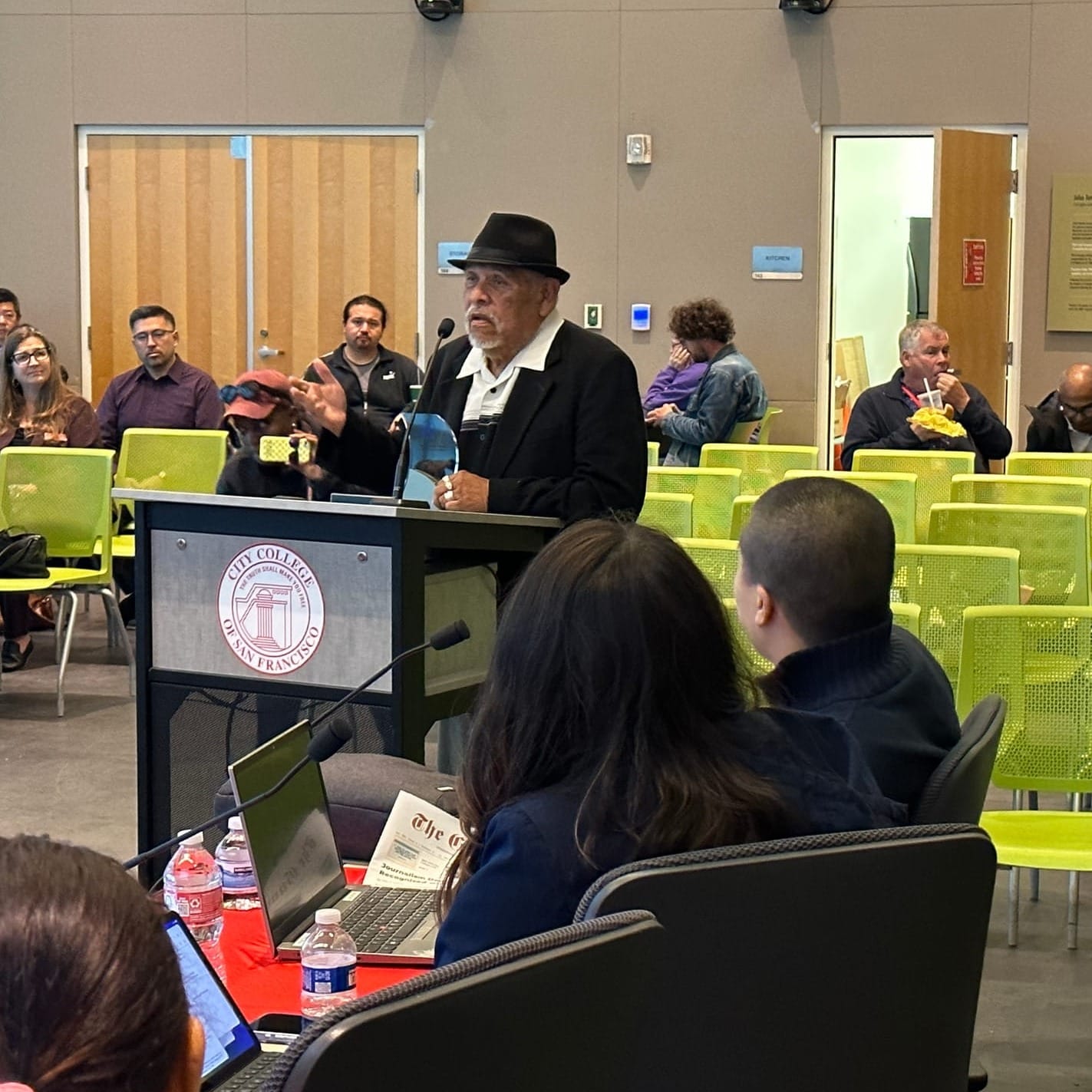For nearly half of City College of San Francisco’s 90-year existence, one faculty member has taught generations of students the ins and outs of reporting, photojournalism and the importance of seeking the truth with an open mind, no matter where it may take them.
Forty-one-year Department of Journalism Chair Juan Gonzales, 78, was recognized by the college’s Board of Trustees at its Oct. 23 meeting for his dedication to the college and his Distinguished Teaching in Journalism Award from the Society of Professional Journalists. He will retire after 41 and a half years of service in June 2026. In fact, this reporter has been one of Gonzales’s students for the past two years.
Board President Anita Martinez, who attended San Joaquin Delta College with Gonzales in the ‘60s, said she was lucky to befriend him when they were students working on the school newspaper. She also highlighted Gonzales’ co-founding of El Tecolote, a bi-weekly newspaper in the Mission District, which turned 55 years old in August.
“I am sad that you are retiring, but you have left a fantastic legacy,” Martinez said.
Other trustees shared their personal gratitude for Gonzales. Chancellor Kimberlee Messina, too, thanked him for his service.

“I’m very impressed with the lifetime of work you have given to not only your field, but to students, and knowing that that legacy will continue even after you have retired,” Messina said.
Once the accolades were over, Gonzales took to the podium to voice his concerns for the future of the department. (Disclosure: The Ingelside Light’s Alex Mullaney teaches journalism at the college.)
“I know this college is struggling to some degree financially, but I think a college like this, in a media market, needs to at least have a journalism department,” he said.
Over the years, a handful of California Community Colleges have scaled back or eliminated journalism programs. Gonzales said he delayed retirement six years to protect the program since his tenure provided a modicum of protection. But now its fate is in the hands of an administration grappling with shaky enrollment, a state funding formula that disfavors schools in high-cost-of-living areas and a dire budget outlook.
Gonzales said the college has a committment ot the media industry to train the next generation of journalists. That means maintaining the department with adequate, tenured instructors.
“If the college reneges on that, then it's it's not fulfilling a very important sector of the city,” he said.
Messina said a committee will determine the timing and number of full-time journalism faculty hired.
“We approved, I believe, 11 positions that we would recruit this year to start next year,” Messina told The Light before the meeting, adding that the hiring would be in that next cycle and the committee is sensitive to departments with small staff pools heavily reliant on department chairs.

The journalism department offered 14 to 15 courses a semester before the accreditation crisis rocked the college in 2012. Now, in the pandemic’s wake, it offers five to six. At the same time, the media industry has been radically changing. Business models that sustain news have changed with new technologies, and AI is threatening some new production.
Yet Gonzales is hopeful for the community college journalism programs, as some are getting help.
The East Bay’s Los Medanos College’s journalism program has struggled with enrollment. Instead of cutting the department, the school recently approved hiring a second full-time faculty member to work with Cindy McGrath, the department chair.
"LMC has always been a strong supporter of a First Amendment forum on campus and their commitment to this new position is testament to that fact," McGrath said.
The extra hands are expected to help the program adapt to changing demands.
“We feel that the department is well-situated to continue working in traditional and new media formats,” said Los Medanos journalism instructor Star Louis Steers.
City College’s journalism graduates have gone on to work at top media publications such as the New York Times, the Atlantic and the Washington Post. Others work for small and independent publications or related fields such as public relations and communications.
“I think if anything, the school should realize how important this program is to that sector of the city that relies on an institution that keeps its residents informed,” Gonzales said.
The proof of his impact was on display not two days after the board meeting when a delegation of students participated in the Journalism Association of Community Colleges’ NorCal conference at San Jose State University. The dozen students in attendance competed and won in many award categories. All told, the students took home 18 awards, including this reporter.











